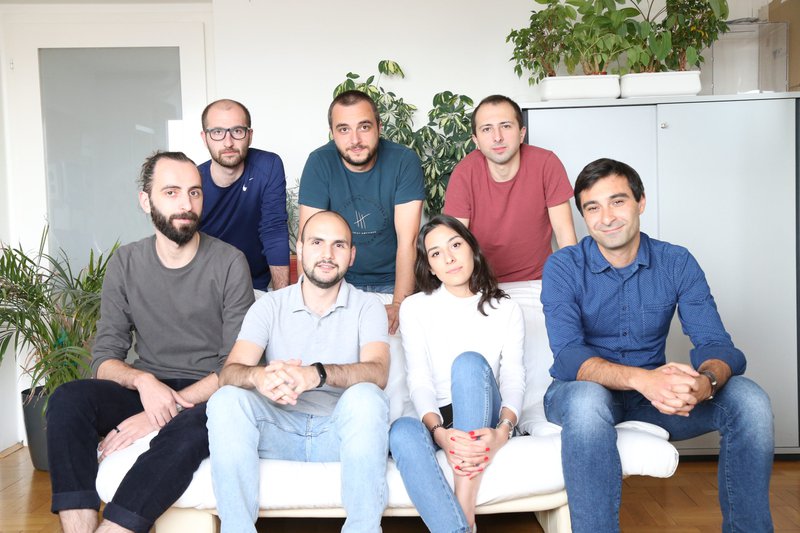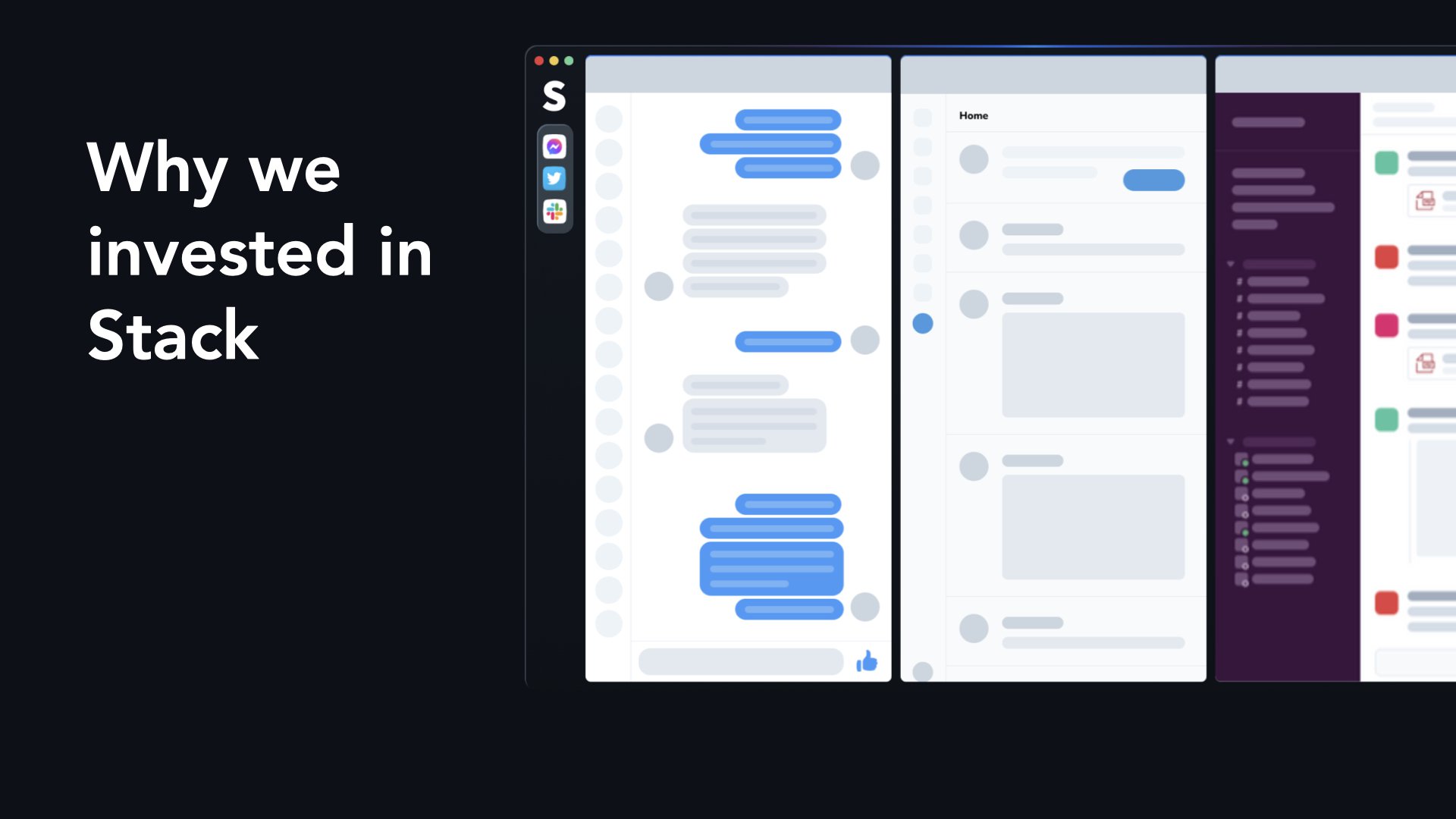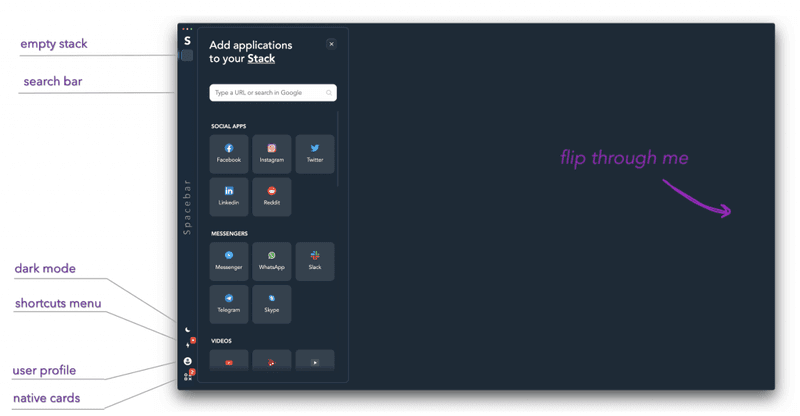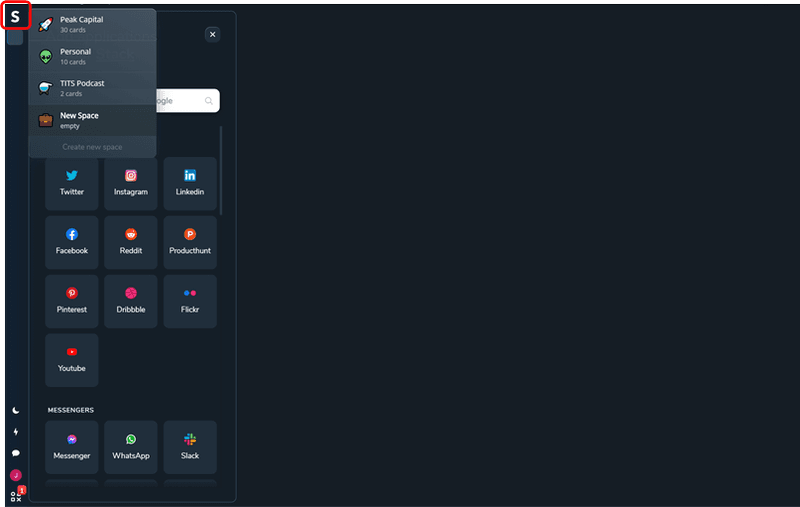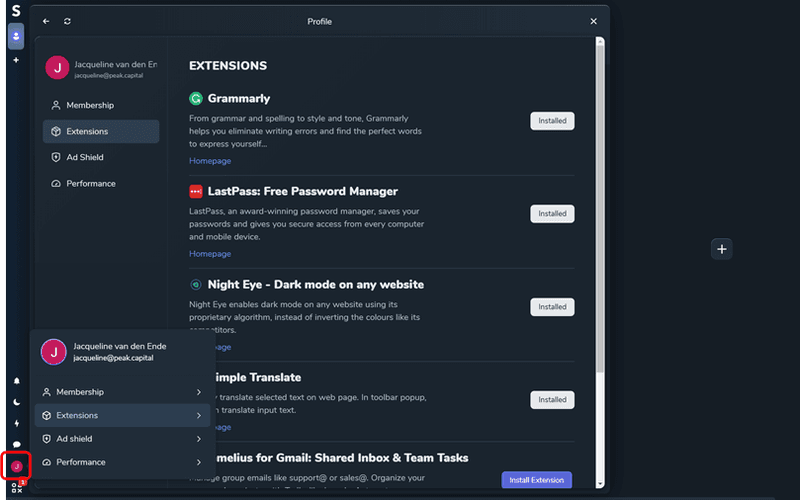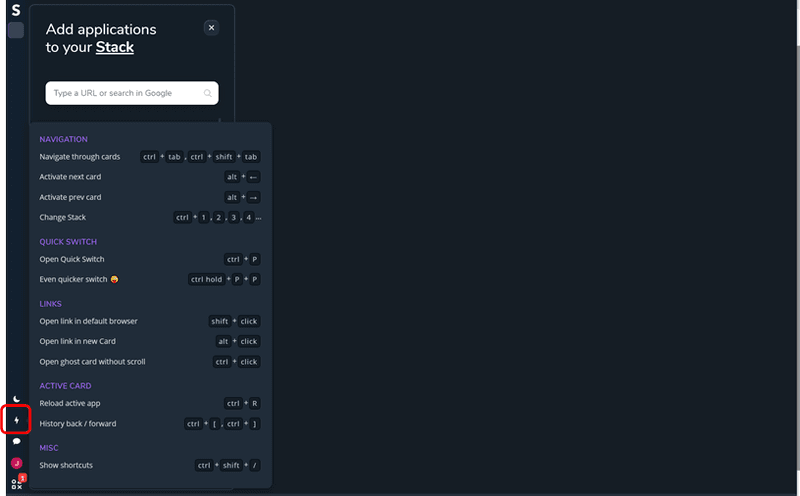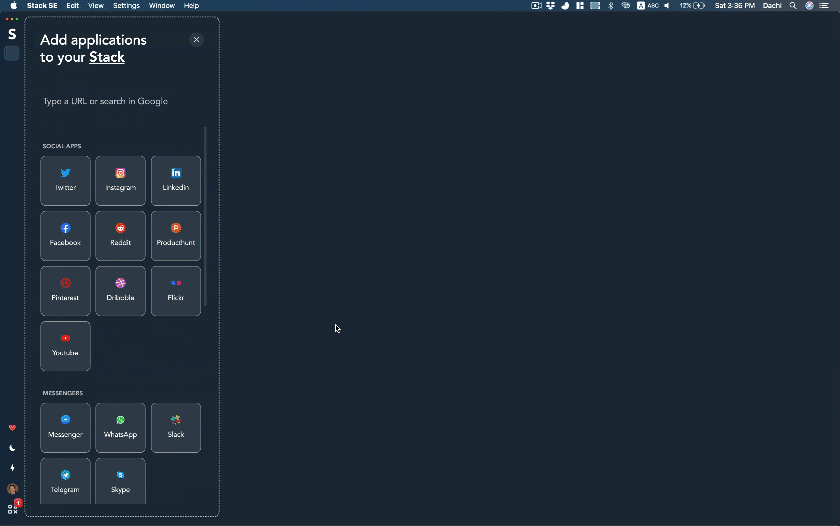
We recently announced our latest investment in Stack, a tab-less browser on the mission to create the “Operating System for the Internet.” Let’s dive deeper.
In this tell-all, we’ll give you a peek into the Stack browser and tackle some pressing questions, including: Is it sensible to invest in a browser? What can we learn from the rise of new productivity tools (👋Notion)? What makes Stack an “unDutch investment”? Lastly, we’ll end with the 5 reasons we’re excited for what’s to come.
Our moment of enlightenment
Never before have we experienced more of an “a-ha” moment than when we met the Stack team. The problem Stack exists to solve is both evident and deeply familiar: utter chaos in our browsers.
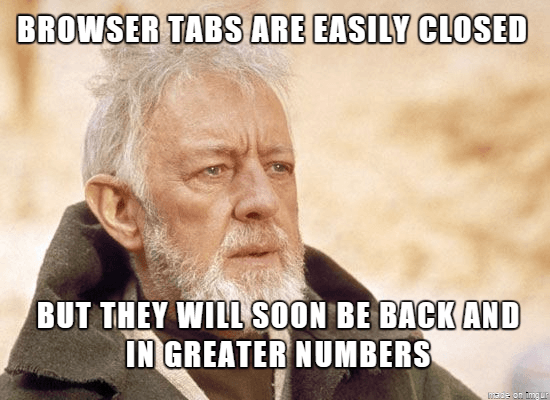
Average tab counts of over 30… with the magic One Tab button as our only escape, that will zip it all closed… safely stored in an infinite list of browser tabs never to be opened again… a 21st century Pandora’s box.
All of the Peak team was – and is – convinced that browser chaos is a real problem that takes a serious toll on our productivity as screen workers. But… would Stack hold the promise to bring inner zen to our browser lives?
Within our team, about 30% immediately adopted the Stack browser. Admittedly, some of us struggled to change the work habits built into our systems over decades. Nevertheless, we realized that the problem is there, the solution fits, and better yet: we’re not alone. With us, over 25,000 users ranging from the USA to Japan (promoted intensely by a few of Japan’s biggest productivity gurus) turn to Stack to bring peace to their workflow.
So, all that is needed now for the Stack team to achieve global domination is to find the proper onboarding flow and optimize the user experience (OK, not all…there is a bit more on their to-do list while scaling their business, obviously). But all in all, a challenge we are keen to take on.
A browser that’s… not a browser? Meet Stack.
In the team’s own words, Stack is:
“not a browser, nor is it a computer program; but it’s an idea:
the idea to make our new virtual home pleasant and human.…we just started with the browser.”
That starting point is Stack, the “productivity browser.” To give you a quick 101, flip through the screengrabs below and download the Stack Browser here.
The user experience of Stack is completely different from conventional browsers. Stack is one app to manage all your web apps and empowers you to manage and operate them in the most efficient way. You can 1) design your own layout, 2) create separate spaces, 3) integrate directly with your most loved extensions, 4) navigate with life-saving shortcuts, and more.
Stack empowers you to design your own internet experience.
Is it sensible to invest in a browser?
Now apart from seeing the problem and the solution, is it sensible to invest in a browser? Chrome has dominated the browser market with a whopping 68% market share, followed at a distance by Safari (10%), Firefox (8%), and Microsoft Edge (7%). One part of what makes investing in new browsers challenging is that our browsing habits are so ingrained in our behavior they might as well be hardwired. This results in significant switching costs to move people from one browser to another (just ask Microsoft…). But, remember those days when Microsoft’s Internet Explorer lost its original share to Chrome…
Stack does not seek to replace Chrome or Microsoft Edge, rather it is here to tackle that particular pain point of ‘death by tab overload.’ There actually is a word for this pain, we found out: tabulitis. Stack focuses on workplace zen and is particularly useful for executing repetitive tasks. Take our job as investors, for example, we can consolidate everything for deal sourcing into one stack (containing Pipedrive + LinkedIn + Crunchbase + ProductHunt + …). The result? A custom experience with no more distracting other tabs! 🙏

David vs Goliath: the unlikely success of productivity apps
Interestingly a whole wave of productivity tools have recently been chipping away at the Google and Microsoft application empires. I would be surprised if Notion is not rapidly decimating OneNote and Evernote’s market share. Other challengers like Airtable are bravely taking on Excel, and Slack upended our make-shift use of Skype and WhatsApp for professional chat purposes a while ago.
These successful products share vital commonalities: they combine a fresh UI with a native focus on integrations (integrations are at the core of their design principles, rather than post-fact). Most importantly, end-users love them. What Notion, Airtable, Slack, and Stack will show, is a bet on David (vs. Goliath) is not a bet wasted.
A big bet in a big market
That said, attempting to launch a browser and get it to scale is no easy task. Indeed, one of our LPs called Stack an “UnDutch investment” – no doubt poking fun at Dutch conservatism (typically Dutchies are known to be a little too level-headed to bet on such go-big-or-go-home type of theses). But, make no mistake: the browser market is huge – and the team has the right ingredients to tackle it.
1. Global validation and a clear GTM
With zero marketing spend on its books, Stack has already won many loyal users. Their early traction shows that people around the globe share the pain of browser tabs. The ‘low-hanging fruit’ for Stack is to penetrate specific self-referencing user groups who use similar sets (or “stacks”) of apps and highly repetitive tasks e.g. marketeers using Stacks of social media apps, product managers using their set of product apps, developers, stockbrokers, and so on. In our interconnected world, these groups seamlessly cut across geographic borders.
Moving forwards, monetization will be a challenging question for a browsing tool like Stack, which requires massive adoption to make a dent. Stack is in the early stages of experimenting with its business model and there are multiple ways they can monetize (certain features in a paid plan, affiliate revenues, search engine deals, advertising). But one thing is clear: we hope the team will remain focused on building a winning product that drives massive adoption and retention first, prior to attempting monetization.
2. Founders who live and breathe their product
In our humble experience, the best-designed products are built by people solving their own pain, who use the products they build every. single. day. Noticing all the little details (ability to drag and drop tabs, ability to mute notifications, toggle dark theme, etc), secret shortcuts, and little jokes in Stack, it is clear to us that the founders of Stack live and breathe their product. This bleeds into a winning attention to customer feedback.
3. Obsession with customer feedback
On top of using the product themselves, Stack is fully built around user feedback. Through their live chat – which the team seems to man 24/7 – they collect feedback from users as well as through their Feature Request section, where you can add new feature requests or upvote existing ones. Their data-driven laser focus on customer needs and behavior is crucial in buildling a product that end-users love.
4. Stickiness as a double edge sword
As mentioned, the tricky thing about browsers (but also the great beauty of them) is stickiness. Due to the high frequency of use, browsers are habit-creating… and old habits die hard. A double-edged sword and a tough barrier to overcome, but the reward is worth it. Once people find Stack addresses their pain and start to use Stack intensively, they quickly grow hooked.
The average Stack user uses the solution 1.8 hours a day. For such an early-stage company, this is quite an achievement; especially considering that said average also contains those who aren’t fully hooked (yet). Stack also achieves a 45% score on the Sean Ellis test, which answers the question “How disappointed would you be if you could no longer use this product?” as well as a 4.8 ProductHunt rating. Across the board, positive signs of product-market fit.
5. Team, Team, Team (…Team)
To us, and especially with early-stage investments, there is no greater consideration than the team itself. We already mentioned a few things we love about the Stack team above (live and breathe their product, obsession with customer feedback); but we forgot to mention their superior tech and design skills, high levels of self-reflectiveness, honesty, proactive communication style, and downright perseverance. The Stackers – all Georgians now living in the Netherlands – have a global mindset to back up their global product.
Dachi, Ika, Ziko, George, David, and the rest of the team, we look forward to working with you to make Stack soar to great heights of browser delight and user adoption.
